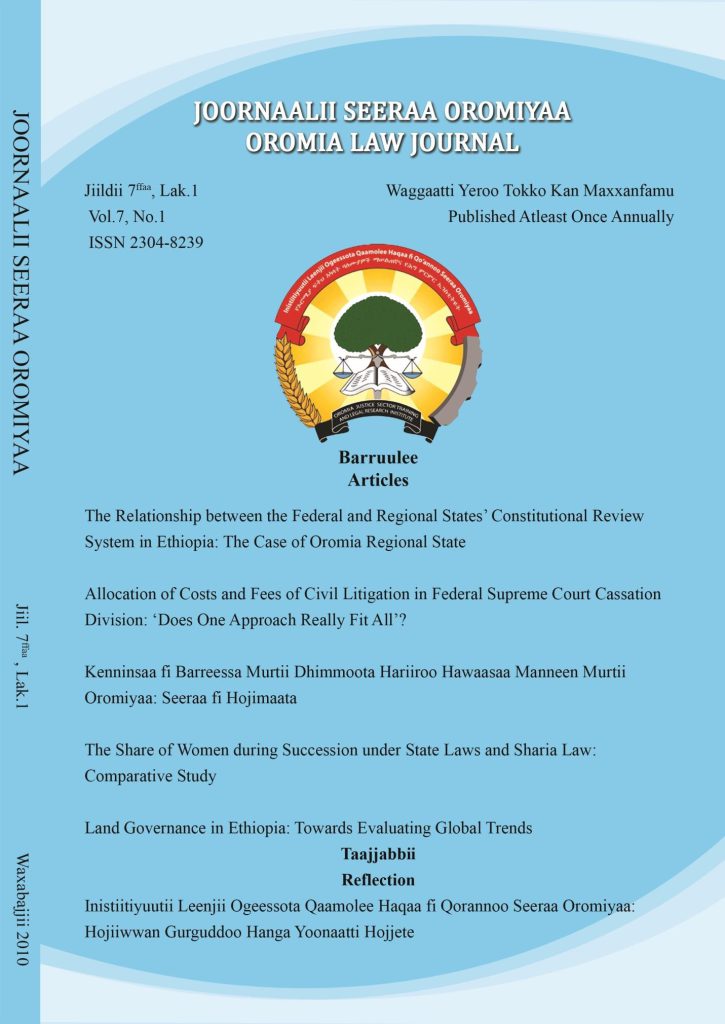Oromia Law Journal (OLJ), a journal hosted by Oromia Legal Training and Research Institute, is annually published journal. Supported by government budget, it provides immediate open access to its content on the principle that making research freely available to the public supports a greater global exchange of knowledge. It is indexed on African Journals Online and Hein online. It is also one of the journals in Ethiopia having first National Accreditation by Ministry of Science and Higher Education in 2020.
Submission Guidelines
Submissions may be initiated following a call for contributions to be made by affixing notices on notice boards of the Institute or other government bureaus; publicizing on the website of the Institute and/or the journal or personal correspondences via e-mail or phone.
Publishable contributions shall include articles, book reviews, case analysis, research works, summary of new legislations, educative court judgments, etc. Research works to be submitted shall follow all procedures of a research. So, they must contain title, introduction, body, conclusion, footnote and references with clear and standardized languages. Sources used for writing should be properly referenced following bluebook citation styles.
Size and page number of contributions shall be as follows:
- Articles shall be written in MS Word, Times New Roman style, 1.5space, 12 Font size and within range of 15-30 pages for Afaan Oromoo; and 10-30 pages for English and Amharic. Case analysis and book reviews shall be 5-10 pages.
- Footnotes shall be written in MS Word, Times New Roman styles and 10 Font size for Afaan Oromoo and English. The same is true for Amharic except that the font size shall be 9.
- Page margins in all sides shall be 2 cm.
Scope of the journal
Submissions should be articles (not published elsewhere) related to legal, economic, political and social issues arising in relation to Oromia’s, Ethiopia’s, and other related international laws. Contributions could also be other works such as essays, comments on legislation, book reviews, court cases (with or without comments). However, contributions dealing with practical problems of judicial and prosecution offices of Oromia National Regional State are highly encouraged.
Scope of the journal
Submissions should be articles (not published elsewhere) related to legal, economic, political and social issues arising in relation to Oromia’s, Ethiopia’s, and other related international laws. Contributions could also be other works such as essays, comments on legislation, book reviews, court cases (with or without comments). However, contributions dealing with practical problems of judicial and prosecution offices of Oromia National Regional State are highly encouraged.
Focus and Objectives
The journal publishes original scholarly submissions that make significant contribution to or bring new insights as regards the understanding, development and implementation of the law applicable in the region and beyond. Accordingly, it has the following objectives:
- To increase the competence, ethics, attitudes and sense of public servant of legal professionals by supporting training and research of the Institute.
- To serve as a reference and source for the laws to be enacted within the region and beyond.
- To avoid the disparity between the law and the practice.
- To mitigate possible grievances of the public on the justice service delivery system by giving similar decisions on similar cases.
- To serve as a forum where legal professionals massively participate in discussions and criticisms of legal issues.
Publication of articles or other forms of contributions in the journal is free. The journal does not charge authors manuscript submission, processing or publishing fee.
Publication History
The Oromia Law Journal started publication in 2012. Since then it has been in publication once in a year without interruptions. All issues are available and can be freely downloaded under back issues menu.
Journal sections
Publishable contributions shall include articles, book reviews, case analysis, research works, summary of new legislations, educative court judgments, etc.
Articles: original scholarly piece based on extensive review and analysis of primary data and/or literature.
Book Reviews: provide readers with informative and critical discussion of the books under discussion
Case Analysis: court cases with critical evaluation of the merits.
Research works: similar to articles but these are primary of field based ones.
Summary of new legislations: these facilitate understanding of the new laws by identifying their core objectives.
Educative court judgments: land marking court cases as they are without comments. The idea is that the judgments in their own are educative.
Index Information
Oromia Law Journal is indexed on African Journals Online and Heinonline.
About the Oromia Law Journal
Oromia Law Journal (OLJ), a journal hosted by Oromia Legal Training and Research Institute, is annually published journal. Supported by government budget, it provides immediate open access to its content on the principle that making research freely available to the public supports a greater global exchange of knowledge. It is indexed on African Journals Online and Heinonline. It is also one of the journals in Ethiopia having first National Accreditation by Ministry of Science and Higher Education in 2020.

